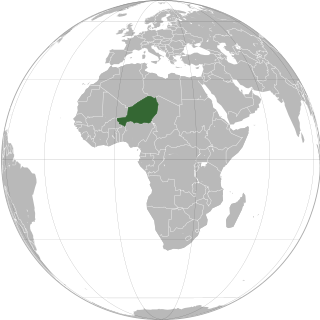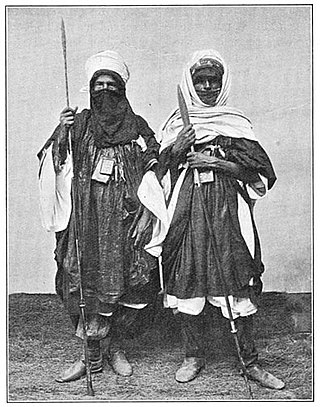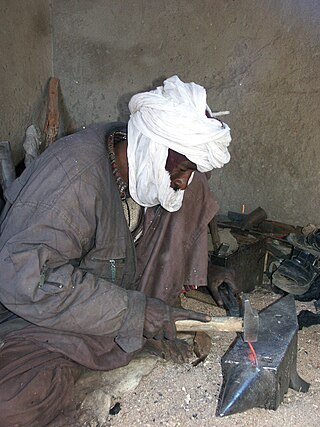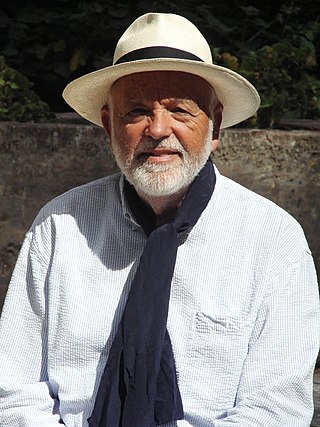
Niger, officially the Republic of the Niger, is a landlocked country in West Africa. It is a unitary state bordered by Libya to the northeast, Chad to the east, Nigeria to the south, Benin and Burkina Faso to the southwest, Mali to the west, and Algeria to the northwest. It covers a land area of almost 1,270,000 km2 (490,000 sq mi), making it the largest landlocked country in West Africa and the second largest landlocked nation in Africa behind Chad. Over 80% of its land area lies in the Sahara. Its predominantly Muslim population of about 25 million lives mostly in clusters in the south and west of the country. The capital Niamey is located in Niger's southwest corner along the namesake Niger River.

The Tuareg people are a large Berber ethnic group, traditionally nomadic pastoralists, who principally inhabit the Sahara in a vast area stretching from far southwestern Libya to southern Algeria, Niger, Mali, and Burkina Faso, as far as northern Nigeria.

The Tuareg languages constitute a group of closely related Berber languages and dialects. They are spoken by the Tuareg Berbers in large parts of Mali, Niger, Algeria, Libya and Burkina Faso, with a few speakers, the Kinnin, in Chad.

Azawad, or Azawagh, was a short-lived unrecognised state lasting between 2012 and 2013. Azawagh (Azawaɣ) is the generic Tuareg Berber name for all Tuareg Berber areas, especially the northern half of Mali and northern and western Niger. The Azawadi declaration of independence was declared unilaterally by the National Movement for the Liberation of Azawad (MNLA) in 2012, after a Tuareg rebellion drove the Malian Armed Forces from the region.

From 1990 to 1995, a rebellion by various Tuareg groups took place in Niger and Mali, with the aim of achieving autonomy or forming their own nation-state. The insurgency occurred in a period following the regional famine of the 1980s and subsequent refugee crisis, and a time of generalised political repression and crisis in both nations. The conflict is one in a series of Tuareg-based insurgencies in the colonial and post-colonial history of these nations. In Niger, it is also referred to as the Second or Third Tuareg Rebellion, a reference to the pre-independence rebellions of Ag Mohammed Wau Teguidda Kaocen of the Aïr Mountains in 1914 and the rising of Firhoun of Ikazkazan in 1911, who reappeared in Mali in 1916. In fact, the nomadic Tuareg confederations have come into sporadic conflict with the sedentary communities of the region ever since they migrated from the Maghreb into the Sahel region between the 7th and 14th centuries CE. Some Tuareg wanted an independent Tuareg nation to be formed when French colonialism ended. This, combined with dissatisfaction over the new governments, led some Tuareg in Northern Mali to rebel in 1963.

Marcel Beyer is a German writer.

The 2007-2009 Tuareg rebellion was an insurgency that began in February 2007 amongst elements of the Tuareg people living in the Sahara desert regions of northern Mali and Niger. It is one of a series of insurgencies by formerly nomadic Tuareg populations, which had last appeared in the mid-1990s, and date back at least to 1916. Populations dispersed to Algeria and Libya, as well as to the south of Niger and Mali in the 1990s returned only in the late 1990s. Former fighters were to be integrated into national militaries, but the process has been slow and caused increased resentment. Malian Tuaregs had conducted some raids in 2005–2006, which ended in a renewed peace agreement. Fighting in both nations was carried on largely in parallel, but not in concert. While fighting was mostly confined to guerrilla attacks and army counterattacks, large portions of the desert north of each nation were no-go zones for the military and civilians fled to regional capitals like Kidal, Mali and Agadez, Niger. Fighting was largely contained within Mali's Kidal Region and Niger's Agadez Region. Algeria helped negotiate an August 2008 Malian peace deal, which was broken by a rebel faction in December, crushed by the Malian military and wholescale defections of rebels to the government. Niger saw heavy fighting and disruption of uranium production in the mountainous north, before a Libyan backed peace deal, aided by a factional split among the rebels, brought a negotiated ceasefire and amnesty in May 2009.

The Kaocen revolt was a Tuareg rebellion against French colonial rule of the area around the Aïr Mountains of northern Niger during 1916–17.

Robert R. Fowler is a Canadian diplomat and was the special envoy of UN Secretary-General Ban Ki-moon to Niger from mid-2008 to 2009, to find a solution to the conflict in Agadez region.
The May 23, 2006 Democratic Alliance for Change is a Malian Tuareg rebel group, formed in 2006 by ex-combatants from the 1990s Tuareg insurgency in Mali. In 2007, splinters of the organisation returned to combat in northern Mali, launching the Malian element of the 2007 Tuareg insurgency. Led by Ibrahim Ag Bahanga, this ADC faction continued to operate under that name, despite most elements remaining under ceasefire. In July 2008, most of these elements, along with much of the splinter following Ag Bahanga reached another accord with the Malian government in Algiers. Ag Bahanga and a faction of that group rejected the accord and fled to Libya. At the end of 2008, this faction returned to fighting, operating under the name Alliance Touaregue Nord Mali Pour Le Changement (ATNMC). The government of Mali has contended since 2007 that the Ag Bahanga faction of the ADC is a "band of marginals" who were "isolated from the heart of the Tuareg community", primarily motivated by lucrative Trans-Saharan smuggling operations operating from Ag Bahanga's home town of Tin-Zaouatene. Ag Bahanga and the other leaders of his faction contend that the government of Mali oppresses the Tuareg population of the north, and has repeatedly failed to live up to its agreements with the ADC and other groups. Outside observers have also speculated that internal rivalries between Tuareg from the Kel Adagh and the Ouilliminden confederations have frustrated peace attempts.
The Ikelan are a caste within Tuareg society, who were at one time slaves or servile communities in their natives lands like Mauritania, Mali and Niger.

Tagdal is a mixed Northern Songhay language of central Niger. Ethnologue considers it a "mixed Berber–Songhay language", while other researchers consider it Northern Songhay. Nicolaï (1981) argued that Tagdal was originally derived from the Tuareg languages and adopted characteristics of Songhai rather than vice versa.

The Inadan, also referred to as Enad or Tinadan, have been one of the historic artisan castes in West Africa, particularly among the Tuareg people. Sometimes referred to as an endogamous caste and sometimes as endogamous marginalized class within the Tuareg, the Inadan are found in Niger, Mali, Libya, Sahel and other parts of sub-Saharan Africa.

Johann Georg August Wirth was a German lawyer, writer and politician during the Vormärz period that preceded the German revolutions of 1848–1849.
Nils Seethaler is a German cultural anthropologist. He researches historical collections of ethnological objects and human remains.

Landgravine Elisabeth Juliana Francisca of Hesse-Homburg, German: Elisabeth Juliana Franziska Landgräfin von Hessen-Homburg, official titles: Landgräfin zu Hessen, Fürstin zu Hersfeld, Gräfin zu Katzenelnbogen, Diez, Ziegenhain, Nidda, Schaumburg, Isenburg und Büdingen, was a landgravine from the House of Hesse-Homburg and through marriage Fürstin of Nassau-Siegen.

Duchess Amalie Louise of Courland, German: Amalia Luise Herzogin von Kurland, official titles: Herzogin in Livland, zu Kurland und Semgallen, Fürstin zu Pilten, was a duchess from the House of Kettler and through marriage Fürstin of Nassau-Siegen. She was regent of the Principality of Nassau-Siegen for her stepson Frederick William II in the period 1722–1727.
Thomas Bierschenk is a German ethnologist and sociologist. He is Professor of African Cultures and Societies at the Institute for Anthropology and African Studies at the University of Mainz.

Gerd Spittler is a German ethnologist.

Erdmute Alber is a German ethnologist with research focus in political and kinship anthropology. Since 2010 she has held the chair in Social Anthropology at the University of Bayreuth.















